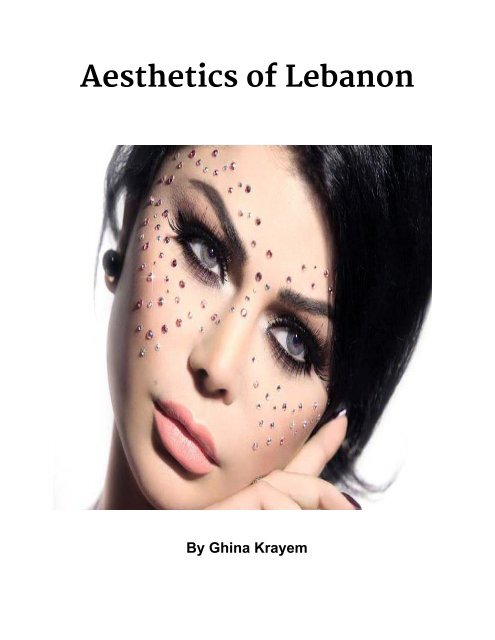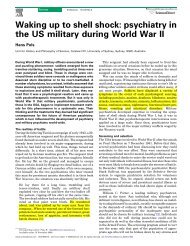Aesthetics of Lebanon
Create successful ePaper yourself
Turn your PDF publications into a flip-book with our unique Google optimized e-Paper software.
<strong>Aesthetics</strong> <strong>of</strong> <strong>Lebanon</strong><br />
By Ghina Krayem
Every culture has what is acceptable and what is not. Some cultures are more<br />
lenient and others remain to the old fashioned customs and societal beliefs<br />
especially when it comes to beauty. A different definition <strong>of</strong> beauty becomes<br />
apparent for every culture and society. <strong>Lebanon</strong> is a very good example.<br />
Cynthia Ghazali is the creator <strong>of</strong> the documentary Copy. Cut. Paste., which<br />
discusses the reason why plastic surgeries become essential in the Lebanese<br />
culture. According to Ghazali, “Lebanese beauty has become centered on big<br />
lips tattooed eyebrows, and small noses” (Ghazali 2013). It is even mentioned<br />
that about 1.5 million procedures are done in a year with a population <strong>of</strong> about<br />
4.5 million people. That’s not to say that everyone conforms to such culture,<br />
however, conforming to <strong>Lebanon</strong>’s definition <strong>of</strong> beauty essentially facilitates<br />
the feeling <strong>of</strong> being important.<br />
This plays a huge role on the Male Gaze. Ghazali talks about how seeing and<br />
being seen in the Lebanese culture is very important. She states that in the<br />
span <strong>of</strong> 25 years <strong>of</strong> the civil war in <strong>Lebanon</strong>, people were locked away in their<br />
household away from the trauma. However, now in contemporary times, the<br />
Lebanese culture is “making up for lost times,” (Ghazali 2013). She initiates<br />
the talk by stating how many men are usually sent out <strong>of</strong> the household to<br />
study abroad, which leaves a surplus <strong>of</strong> women and not very much men,
creating a competition. Women feel that they are not deemed suitable or good<br />
enough in society without the need to surgically alter their physical<br />
appearances not only for themselves, but primarily for everyone else<br />
especially men. Education is no longer taken into consideration and it<br />
becomes a mere matter. “Many women in <strong>Lebanon</strong> are competing to find a<br />
husband, even though they are highly-educated,” Ghazali said. “The end goal<br />
for women is to find a good husband and build a family” (Ghazali 2013). Being<br />
beautiful is not only a product <strong>of</strong> their self-esteem, it also becomes a product<br />
<strong>of</strong> competition <strong>of</strong> marriage.<br />
Self esteem plays a huge role within this matter. Not only is there a struggle<br />
to find a husband, there is also the issue <strong>of</strong> successfully achieving this<br />
competition be able to play the part. In order to play the part, you must dress<br />
the part. With all these plastic surgeries originality becomes extremely rare<br />
because self esteem subjugates the idea <strong>of</strong> possibly seeming different strange<br />
in the Lebanese society. A girl as little as nine years old within the<br />
documentary, was dieting and fulfilling a low carb diet, following in the<br />
footsteps <strong>of</strong> her mother to be able to fit in society and to look beautiful. She is<br />
also given makeup as a gift to experiment when she’s younger and start the<br />
ignition <strong>of</strong> her inevitable future.
In the past, it use to be difficult to undergo such procedures due to the<br />
expenses; however, <strong>Lebanon</strong> has made this easier for the society, thus,<br />
fulfilling the supply and demand chain. Ghazali explained that The First<br />
National Bank located in <strong>Lebanon</strong> enables plastic surgeries to happen by<br />
allowing people to take out loans for the plastic surgeries. In addition to this,<br />
the normal cost <strong>of</strong> a plastic surgery is very expensive, but in <strong>Lebanon</strong> it is only<br />
a fifth <strong>of</strong> the price making it extremely convenient for the society. Ghazali<br />
also explains how people even spend their vacation time to undergo these<br />
procedures and have time to heal to their utmost convenience.The main point<br />
is the fact that the society not only affects the people but the economy as<br />
well. This shows how even to that extent women must fulfill their desires to<br />
be seen in the their idea <strong>of</strong> the most beautiful way possible.<br />
Another documentary called The Illusionists discusses the different types <strong>of</strong><br />
beauty all around the world. She then mentions Beirut, <strong>Lebanon</strong> and how<br />
everyone seems to look the same. That is due to the similar cosmetic<br />
surgeries that almost everyone undergoes at least once in their life, whether<br />
it is because they want to or they are pressured into doing so themselves from<br />
society. Cynthia Ghazali herself is content with her appearance however she<br />
states that when she visits <strong>Lebanon</strong>, she feels different. It is as if you are
asically an foreign outsider. People begin to<br />
look at you different as they did with Cynthia<br />
regardless <strong>of</strong> our image <strong>of</strong> the westernized<br />
beauty that Ghazali. The Illusionists not only<br />
describes the way the Lebanese define beauty<br />
but also the way every other culture defines<br />
their beauty. It even mentions the ideal<br />
Japanese look and how they must have a<br />
certain slender physique. Every conveys their<br />
own ideal type <strong>of</strong> beauty but <strong>Lebanon</strong> seems<br />
to stand out with being the center <strong>of</strong> plastic<br />
surgery according to Ghazali and her<br />
research.<br />
Aside from how this relates to the male gaze, it also ties in with the idea <strong>of</strong><br />
Patriarchy. According to bell hooks, “Patriarchy is a political social system<br />
that insists that males are inherently domineering, superior to everything<br />
and everyone deemed weak, especially females, and endowed with the right<br />
to dominate and rule over the weak and to maintain that dominance through<br />
psychologically terrorism and violence” (hooks 18). As mentioned earlier, it is<br />
a competition for women because looking beautiful ties in with the achieving<br />
the man. Women must appear in a perfect state at all times in the eyes <strong>of</strong><br />
men. Otherwise, they potentially will not be considered worthy <strong>of</strong> friendship<br />
or even marriage in the Lebanese society. Education is no longer in the<br />
equation as a matter <strong>of</strong> aesthetics except for the man because he is allowed to<br />
travel abroad to receive his. This unfortunately deems men more superior as<br />
hooks mention and thus the weaker sex. The men can choose as they please,<br />
but the women must have to compete like savage animals to be chosen. Now,
this is not true in all case, however, Arabic people have a certain culture in<br />
<strong>Lebanon</strong> and men are just considered with more dominance. They are<br />
considered to support the family and handle the monetary aspect <strong>of</strong> things;<br />
thus, they are deemed more worthy and superior in society giving women no<br />
choice but to try and be seen rather than be invisible, attracting the male gaze<br />
essentially. This is where Ghazali’s idea <strong>of</strong> seeing and being seen comes into<br />
play.<br />
One woman who defines beauty and the<br />
superiority <strong>of</strong> women that also happens to be a<br />
Lebanese born Palestinian is Mona Hatoum.<br />
Mona Hatoum centers her artwork with<br />
oppression, violence, and voyeurism. Her work<br />
greatly reflects what women go through in<br />
<strong>Lebanon</strong> possibly reflecting her own lifestyle<br />
during the time she was there as well.<br />
A famous piece <strong>of</strong> hers happens to<br />
be Measures <strong>of</strong> Distance created in<br />
1988. This is a short film <strong>of</strong> her<br />
mother and her that shows arabic<br />
letters are being written on the<br />
screen reflecting the distance<br />
between them, since Hatoum was<br />
sentenced in exile in London due<br />
to the civil war in <strong>Lebanon</strong>. In<br />
these letters, Hatoum explains<br />
that she “was also trying to go against the fixed identity that is usually<br />
implied in the stereotype <strong>of</strong> Arab woman as passive, mother as non-sexual
eing … the work is constructed visually in such a way that every frame<br />
speaks <strong>of</strong> literal closeness and implied distance” (Hatoum 140). Hatoum<br />
basically breaks though the stereotype <strong>of</strong> Arab women only being a “passive<br />
mother” according to the men. However, there is more to women than just<br />
that according to Hatoum and she describes it through her artwork rather<br />
than conforming to the society as everyone else does to fit in.<br />
Another artist that exceeds the barriers <strong>of</strong> being a<br />
woman is Huguette Caland. She began her<br />
artwork in the 196s. Her artwork centers around<br />
very erotic images that she essentially creates<br />
earning her the title <strong>of</strong> a feminist because she<br />
chose art as her field and became successful for<br />
it. In addition, she broke the taboo in the Arabic<br />
culture by creating such images not caring what<br />
everybody else thinks, which is a huge concern in<br />
the Lebanese culture. Reputation and<br />
somebody’s image is heavily considered in<br />
the Lebanese culture. It is also what a groom<br />
considers when choosing his mate, aside<br />
from her looks because that is what attracts<br />
him first according to Ghazali. Caland’s<br />
reputation has not tarnished in her eyes and<br />
that was what mattered to her, aside from<br />
the fact that she was doing something she<br />
extremely loved and that was her art. She just pursued her dreams and<br />
aspirations and continued doing what she loves best.
Moreover, although <strong>Lebanon</strong> is considered to have the most plastic surgeries,<br />
it is due to the high standards and competition. However, not all Lebanese do<br />
this and are still successful in their future like Mona Hatoum and Huguette<br />
Caland for example. This may be due to their advantageous locations,<br />
considering the fact that they did not reside in <strong>Lebanon</strong> all their lives.<br />
However, they were able to break from the societal expectations and peer<br />
pressure <strong>of</strong> not having to “compete” for anyone according to Ghazali. Many<br />
things are also taken into consideration as well like self esteem. Ghazali adds<br />
how the plastic surgeries are fed by the self esteem <strong>of</strong> the nation, which is<br />
why it is a lucrative and prosperous business. A better economy leads to<br />
better stability for the nation and so on. <strong>Lebanon</strong>’s definition <strong>of</strong> beauty<br />
essentially facilitates the feeling <strong>of</strong> being important and raises the self<br />
esteem, which is why it is prominent. Overall, the art <strong>of</strong> one’s beauty is causal<br />
<strong>of</strong> one’s cultural ideals.
Works Cited<br />
"Huguette Caland." Please Note. Lombard Fried Gallery, n.d. Web. 21 Apr. 2015.<br />
Manchester, Elizabeth. "Mona Hatoum, 'Measures <strong>of</strong> Distance' 1988." Tate. Elizabeth<br />
Manchester, Feb. 2000. Web. 21 Apr. 2015.<br />
McKay, Hollie. "Real Housewives <strong>of</strong> Beirut? Filmmaker Says Plastic Surgery an 'epidemic' in<br />
<strong>Lebanon</strong>." Fox 411. Hollie McKay, 13 Mar. 2013. Web. 21 Apr. 2015.<br />
Riggs, Terry. "Mona Hatoum, 'Measures <strong>of</strong> Distance' 1988." Tate. Terry Riggs, Nov. 1997. Web.<br />
21 Apr. 2015.<br />
Vartanian, Hrag. "The Colorful Past <strong>of</strong> Huguette Caland." Hyperallergic RSS. Hrag Vartanian,<br />
16 Dec. 2014. Web. 21 Apr. 2015.<br />
Zeilinger, Julie. "The Disturbing Effect Our Beauty Standards Have on Women Across the<br />
World." Mic. Julie Zeilinger, 27 Feb. 2015. Web. 21 Apr. 2015.



